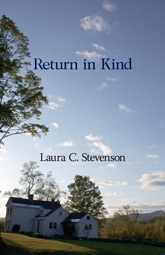A New Series: One Minute Reviews of
Books by Vermont Authors
Laura's column "One Minute Reviews" has appeared bi-weekly in Wilmington, Vermont's Deerfield Valley News since 2015. In April 2018, she found that no Vermont periodical consistently reviews all commercially published fiction and non-fiction by Vermont authors, so she started a series to fill that void. Published reviews from that series and some earlier reviews of local authors are listed with links to a scan of the printed copy. Reviews still in queue are listed without links until they appear in print.
The books reviewed in this series are available through Wilmington's Pettee Memorial Library, the Whitingham Free Public Library, and locally owned Bartleby's Books in Wilmington.
Deerfield Valley News, 10/3/2024
Clever plotting, good background
Sarah Stewart Taylor, Agony Hill. Minotaur Books, 2024
With Agony Hill, Sarah Stewart Taylor, the Vermont author known for her Maggie D’Arcy mysteries, has begun a new series, set in Bethany, Vermont. Bethany is an imaginary small town, but Taylor’s Vermont of 1965—with its distant view of the coming Interstate, its concern for a dwindling local population, its uneasiness about recent ‘back-to-the-land’ settlers and their anti-Vietnam War views—provides an historical background for a complex mystery with interesting characters.
Chief among these characters are the three people through whose eyes the action is seen. The first is Franklin Warren, who has been hired by the recently formed Vermont State Police as a detective. As Bethany’s residents (and the reader) gradually learn, Warren, though a “hot shot” cop as well as a perceptive man, is escaping a traumatic past that causes him to have flashbacks at crucial moments in the action.
The second is Warren’s next door neighbor, Alice Farnham Bellows, who moved back from Cairo to her family’s handsome house facing the Bethany Green ten years ago. Her return followed the death of her husband, whose suspicious “diplomatic service” abroad still affects her life.
The third is Sylvie Weber, the quiet wife of Hugh Weber, the perpetually angry ‘back-to-the-land’ farmer who has for the past years antagonized almost everybody in Bethany with his letters to the editor, his obsession with the Interstate, and his drunken episodes at the town tavern. Sylvie, who married Weber at age 17 to escape a French-Canadian farming family of nine children, now has four boys of her own, with another child due at Christmas. Nobody in town (except Alice Bellows) really knows her. Some (including Warren, initially) wonder if she is ‘simple.’
By alternating between these three voices, Taylor builds suspense in a story that would otherwise be a simple whodunnit, allowing her to study the complex inter-relationships of a small town. The book opens with a chilling Prologue, in which Sylvie looks up from the beautiful swimming hole where her boys are playing—and sees a man with a knife. The scene abruptly switches to the next day, when a telephone call on Alice’s phone summons Warren to the Weber Farm on Agony Hill, where Hugh Weber has been found dead inside his burning barn. The barn was locked from the inside, and the local police chief thinks Weber had copied the suicide of Forrest Germond, a farmer who recently committed suicide in his locked barn rather than watch the Interstate run through his beloved land.
Was it suicide? Further evidence suggests not. And a few nights later, a camp above the Weber farm burns to the ground. An arsonist? Perhaps Hugh’s hated brother, who has mysteriously come to town? What about the man with the knife, whom only Sylvie has seen? Warren, trying to put the story together, finds that everybody is holding something back. The reader, only partially enlightened by different points of view, is distracted by incidents that may or may not be connected to Weber’s death. Some incidents plainly point to a sequel; others finally come together in a solved case. Clever plotting and good historical background make an attentive reader hope the sequel will come soon.


